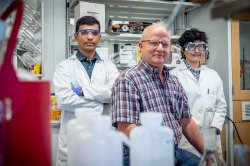Dr. David P. Rotella, Sokol Professor of Chemistry Awarded NIH Funding
He and his collaborators will investigate possible new drug treatments for age-related memory loss.
Posted in: Chemistry & Biochemistry, CSAM Research

Dr. Rotella, along with Dr. Michelle Kelly of the University of South Carolina, and Dr. Charles Hoffman of Boston College, received the funding for a grant entitled Pharmacologic Inhibition of PDE11A for treatment of memory disorders. They have promising leads in developing a class of small molecule enzyme inhibitors that are selective for a key enzyme, whose overexpression in certain regions of the brain is thought to be responsible for this disease. The grant from the National Institutes of Health is worth $3.55M over five years.
Abstract
Age-related loss of memory remains a disease for which there are no effective treatments. Data suggests that an enzyme found in a specific region of the brain associated with memory, phosphodiesterase 11A (PDE11A), is increasingly expressed as humans age, and that levels of key signaling molecules in the brain that are substrates for this enzyme decrease in tandem, leading to the hypothesis that PDE11A is directly responsible for this effect. Our experiments with mice lacking PDE11A revealed that these animals behave and reproduce normally and do not suffer from the same age related loss of memory as their wild type littermates. This data collectively leads to the hypothesis that PDE11A may be a valuable target for study as a means to treat age-related loss of memory. There are no known potent and selective PDE11A inhibitors. A number of other PDE enzymes are under investigation or have been studied for various psychiatric and neurodegenerative diseases, indicating that this family can be targeted by small molecules. A novel screening method using yeast that express human PDE11A identified a number of good starting points. Some of these hits demonstrated excellent selectivity for PDE11A with the potential to be optimized to provide the first potent, selective PDE11A inhibitors with a profile that will allow us to investigate these compounds in mouse models of age-related behavior and memory.
